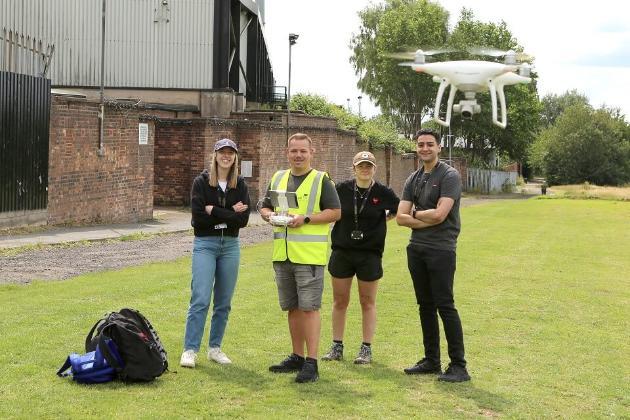Indicative optional modules
ESC-40097 Clean and Green Technologies (30 credits)
This module aims to provide you with an overview of key concepts, debates, processes and discourses in relation to clean technologies, including renewable sources such as wind/wave/solar, and storage technologies such as hydrogen. The module will emphasising how we can use these technologies in specific scenarios, and minimise carbon footprint and assessing the contribution each might make to meeting energy needs sustainably. You will also gain an appreciation of clean technology while developing transferrable employability skills.
GEG-40020 Key Themes in Human Geography and Sustainability (15 credits)
The Key themes in Human Geography and Sustainability module provides cutting-edge insights into the diversity of inquiry, debate and active research currently taking place within contemporary human geography and the diverse range of sustainability-related issues of relevance. In particular, these relate to the current United Nations Sustainable Development Goals (SDGs) and especially the creation of sustainable cities and communities, good health and well being, reduced inequalities and clean energy. Through exposure to current research, students are able to generate new subject-skills and knowledge which they can apply in the real world and which can help in the development of new approaches for tackling current societal challenges. In addition, the module aims to provide you with the skills and opportunity to undertake a critical systematic literature review - a skill highly valued by employers who frequently require a synthesis and quality appraisal of research on particular topics.
PIR-40106 Dimensions of Environmental Politics (15 credits)
This module aims to provide you with an overview of key concepts, debates, processes and discourses in relation to the political dynamics of the environment. The broad introduction to the main facets of environmental politics will also prepare you to specialise in greater depth in one or more areas in other optional modules and their dissertation. You will explore the following three key questions in environmental politics:
- How did the environment come to be seen as a political question?
- How have political institutions responded to what have been called environmental problems?
- What are the challenges such problems individually or collectively pose for existing political structures, institutions, and practices,
and the theoretical presumptions underlying them?
You will also have the opportunity to develop research and communication skills by delivering PowerPoint presentations and participating in weekly debates.
ESC-40101 Collaborative Project (15 credits)*
*Please note you can choose the Collaborative Project module or the Advanced Traineeship module, not both.
This module provides the opportunity to work on real-world issues as you work with staff to identify and approach appropriate collaborative partners and define appropriate projects. You will gain essential employability skills and experience as you are supported to lead collaborative discussions to co-define and co-design a project scope and to review the project's progress and outcomes. You will also develop highly desirable skills in project planning and management, communicating in a professional setting, and problem solving.
GEG-40030 Advanced Traineeships in Geography, Geoscience and Sustainability (15 credits)*
*Please note you can choose the Advanced Traineeship module or the Collaborative Project module, not both.
Advanced traineeships in Human Geography and Sustainability will provide you with real world ‘hands on’ experience of working on a live research project. Through collaboration with a directive research mentor, you will generate a range of new subject-specific and generic research knowledge and skills which will enhance your understanding of contemporary societal challenges as well as future employability. Furthermore, you will generate key insights into different aspects of the research process, ranging from research design and grant preparation to the delivery of impact-related activities and work alongside a range of stakeholders during your research traineeship.
ESC-40047 Green IT (15 credits)
This module will enable you to gain an understanding of the sustainability challenges facing the IT industry and of the strategies and techniques that are available to address these challenges. You will also explore ways in which IT can enhance sustainability in other sectors (e.g. through the use of simulation and modelling software and IT tools such as video conferencing).
ESC-40060 Climate Change Science (15 credits)
You will explore factors affecting the climate and the impacts that this change is having on our planet and its inhabitants. Topics include how climate change comes about, its effects and how to prevent it, including the role of the Intergovernmental Panel on Climate Change (IPCC). You will gain skills and confidence in interpreting and communicating complex information, basic modelling and data analysis related to climate change.
LAW-40043 International Environmental Law (15 credits)
This module offers a critical perspective on the development of international environmental law. It provides a grounding in the legal norms, institutions and processes of the field, and explores current environmental global issues such as biodiversity loss, trade and environment, food security and climate change through specific treaty regimes. Drawing on a range of legal, policy and other literature, the module highlights key challenges facing the regulation of the environment today.
ENL-40005 Academic English for Postgraduate Science Students (15 credits)
This module is designed to help non-native English speaking postgraduate students to develop and refine the specific writing, reading and verbal communication skills they require to succeed in their science degree studies. It aims to help students to research, extract key information, summarise from a variety of sources and engage in academic discussion. This may involve a series of workshops, lectures, assignments, online and practical tasks and projects.







